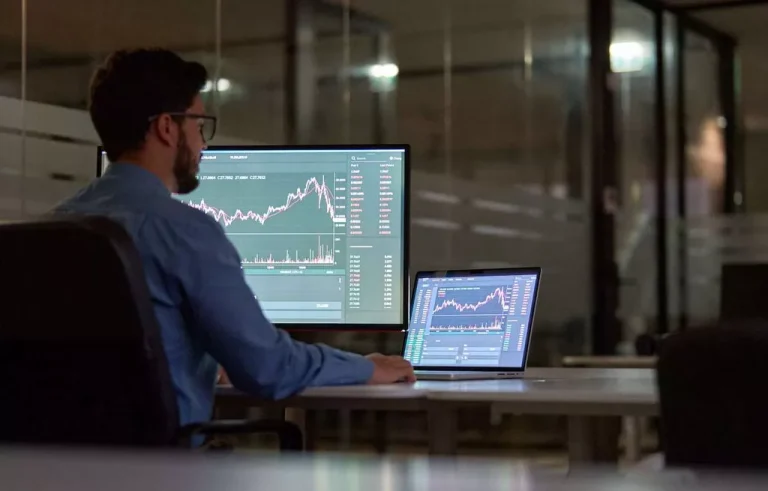Institutional investors use technical indicators and market sentiment analysis to determine tendencies and commerce accordingly. Hedge funds are pooled funding funds that use advanced methods to generate high returns, together with quick selling, leverage, and derivatives trading. newlineThese funds can be extra versatile than conventional mutual funds, often taking both long and short positions in markets. Retail merchants use trading platforms that give them access to shares, bonds, choices, futures, and different monetary vehicles. With the rise of new trading institutional trading methods platforms like SoFi or Robinhood, some retail investors can access IPOs, commodities, cryptocurrencies, and more.
Institutional Trading Technique – Conclusion
The picture above illustrates the concept of choices buying and selling, the place merchants can profit from price movements in the underlying property by trading options contracts. Institutional order circulate buying and selling is a method that relies on the order move of enormous institutional buyers. Companies wanting to record on an institutional trading platform must meet sure rules. Pension funds are investment vehicles that manage cash from employee contributions to their pension plans.
Retail and institutional merchants have totally different approaches in phrases of trading. This distinction in measurement has a huge Smart contract influence on the value of securities, as institutional trades can move prices more than retail trades. Latest stories recommend that institutional buying and selling accounts for over 90% of day by day trading volume in the US inventory market.
On the opposite hand, retail traders trade for themselves, often paying more and dealing with limits on what they can buy or promote. In the financial markets, there are huge differences between institutional and retail merchants. They have different ways of buying and selling, rules to follow, and the way they have an result on the market. Understanding these variations helps us perceive the funding world better. The primary benefit of mutual and funding funds is that they allow for diversification throughout multiple asset lessons, which can help mitigate danger. These funds also are usually extra accessible to retail merchants, as they normally require decrease capital investments.
- As a end result, they sometimes may split trades amongst varied brokers or over time in order to not make a cloth impression.
- Use this data at your personal risk; DayTraderBusiness.com and its associates won’t be answerable for any losses or damages arising from its use.
- In addition, IIF traders additionally depend on financial knowledge and other macro components, such as geopolitical events, for trading alerts.
- There are numerous points of distinction between institutional traders and retail merchants.
- One of some nice advantages of institutional buying and selling is that merchants can trade blocks of at least 10,000 shares and can minimize prices since institutional merchants often negotiate decrease commissions and fees.
Dark Pools Trading: Statistics And Techniques
Traders carefully monitor value ranges and quantity to identify potential breakouts. This technique includes getting into trades when a stock surpasses its recent excessive or low, aiming to profit from the following price momentum. Institutional buying and selling provides several advantages to market participants, including elevated liquidity, price efficiency, and lowered transaction costs. Institutional merchants also deliver expertise and assets to the market, which can help improve total market quality https://www.xcritical.com/.
Be Part Of us at DayTradingBusiness as we unpack these important insights to boost your trading strategy. These establishments are legal entities that accumulate funds from a quantity of completely different investors to trade on their behalf. One of the key advantages institutional traders possess is the power to regulate massive buying and selling capital and execute trades in vital volumes. This gives them the facility to impact share costs and doubtlessly influence market trends. Moreover, institutional merchants get pleasure from access to a variety of securities and contracts, similar to swaps and forwards, which aren’t available to retail merchants. Institutional buying and selling is a posh and dynamic area that requires in-depth information of financial markets, advanced analytical skills, and effective danger management strategies.
Additionally, this approach requires important time and expertise, making it less suited to short-term buying and selling. Even when they’re engaged in short-term trades, their selections are based mostly on a long-term market view. Retail traders typically put cash into shares, bonds, options, and futures, and so they have minimal to no access to IPOs.

Totally Different from most retail traders, institutional traders buy and promote property based mostly on a stable purpose; therefore, they analysis and look for distinctive opportunities. A Quantity Of of the advantages institutional merchants once loved over retail buyers have dissipated. These variations spotlight the contrasting nature of retail and institutional trading. Whereas retail traders focus on managing their private accounts, institutional merchants take care of larger volumes and have higher flexibility in terms of trading charges and access to securities. Institutional traders typically have entry to advanced buying and selling platforms and technology that enable them to execute trades shortly and efficiently.
These can be profitable alternatives for retail traders to identify undervalued companies poised for rapid enlargement. For instance, investing in firms like Uber or Snowflake during their IPOs could yield substantial returns if they mirror institutional strategies. Intraday buying and selling involves opening and shutting trades within a single trading day. Merchants benefit from short-term price movements to make quick income. This strategy requires energetic monitoring of market tendencies, technical analysis, and swift decision-making.
The distinction between institutional and retail traders is not only about cash. Establishments trade differently, using superior expertise, insider networks, and regulatory benefits. Institutional traders usually use brokers and specialized trading platforms to execute their trades. Giant orders may be traded over several days to minimize market impact and cut back the danger of worth slippage. Algorithmic trading and darkish pools are additionally used to execute trades efficiently and discreetly.
The monetary markets function on institutional trading which facilitates huge transactions of shares and foreign exchange together with bonds. Market tendencies emerge from high-value trades implemented by hedge funds, pension funds, mutual funds, and investment banks, which simultaneously affect inventory prices and market liquidity ranges. Institutional trading refers to the process by which massive entities, corresponding to hedge funds, pension funds, and mutual funds, buy and promote massive portions of securities.
Institutional merchants have entry to extra assets, refined tools, and a better degree of experience compared to retail merchants. Institutional trading in day buying and selling entails giant financial institutions, like hedge funds or mutual funds, executing big-volume trades available in the market. In Distinction To individual traders, institutions often have access to advanced tools and data, giving them an edge. Their exercise can create important market movements, making understanding their patterns essential for day merchants. Institutional trading involves the shopping for and promoting of economic belongings by establishments corresponding to banks, hedge funds, and mutual funds. These establishments accumulate funds from a number of traders to trade on their behalf.
Technical-based trading entails putting trades primarily based on technical elements, corresponding to chart patterns and shifting averages. Signs of institutional buying embody massive volume spikes, sudden worth jumps with minimal pullback, and increased exercise during key market hours. For promoting, look for heavy quantity on down moves, speedy declines without a lot bid help, and huge blocks executed at or close to assist levels. In day trading, these alerts often present as sharp, sustained moves pushed by huge players getting into or exiting positions. Mutual funds and funding funds are a kind of collective investment scheme where investors pool their capital together to kind an funding portfolio.

These establishments have vast quantities of capital at their disposal, which they use to spend money on a broad range of property together with shares, bonds, commodities, and currencies. Delving into these fundamentals permits establishments to uncover undervalued gems with robust long-term growth prospects, a strategy often known as value investing. Alternatively, they might establish high-growth companies poised for market dominance, employing a growth investing strategy.
A profession path in institutional trading demands complementary skilled expertise which establishments should acquire. Retail merchants might not match institutional resources, however they have flexibility. Establishments face strict compliance necessities, while retail traders can transfer in and out of trades with out authorized restrictions. By monitoring their positions and methods, particular person traders can acquire valuable insights into market tendencies and potential alternatives.

Leave A Comment